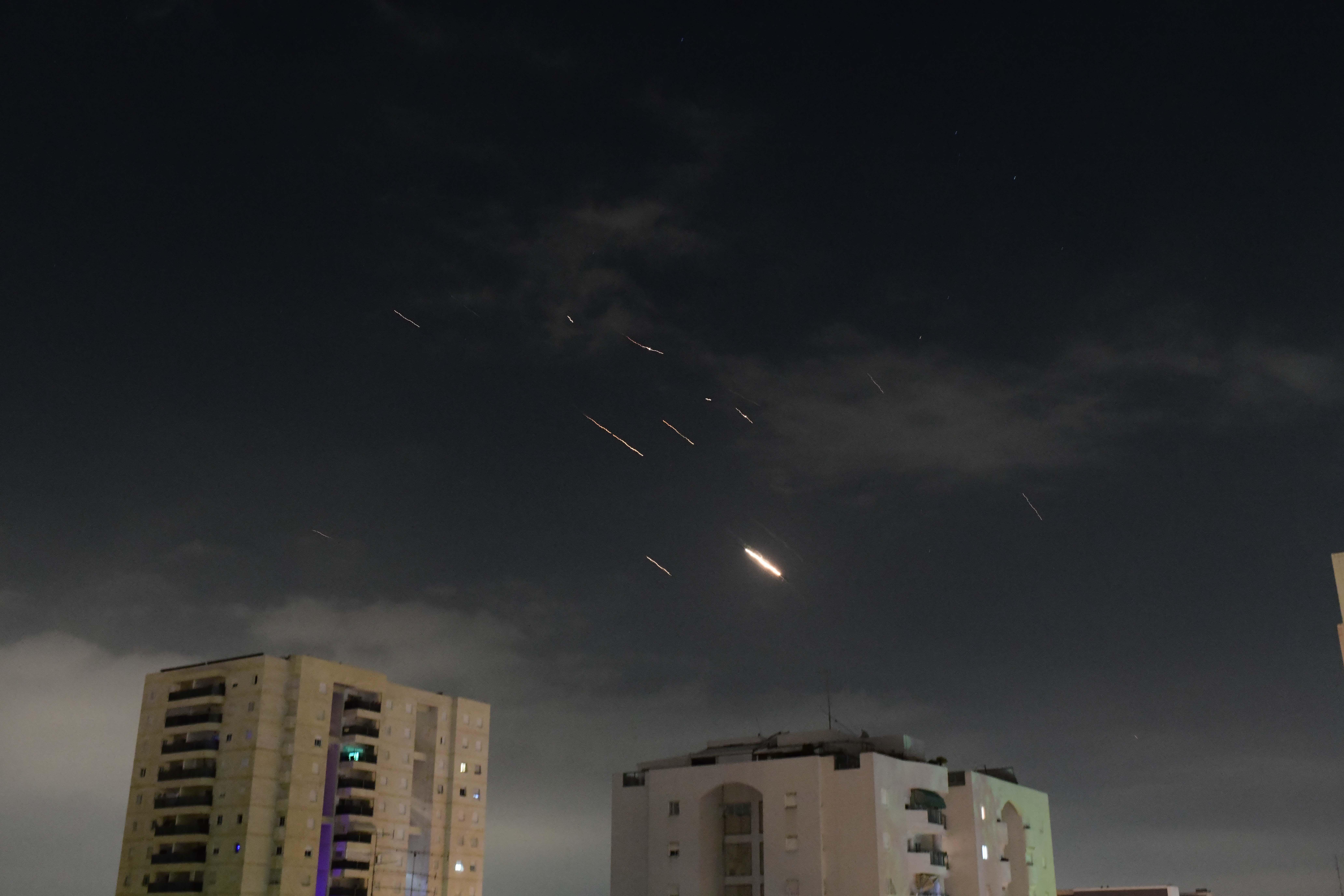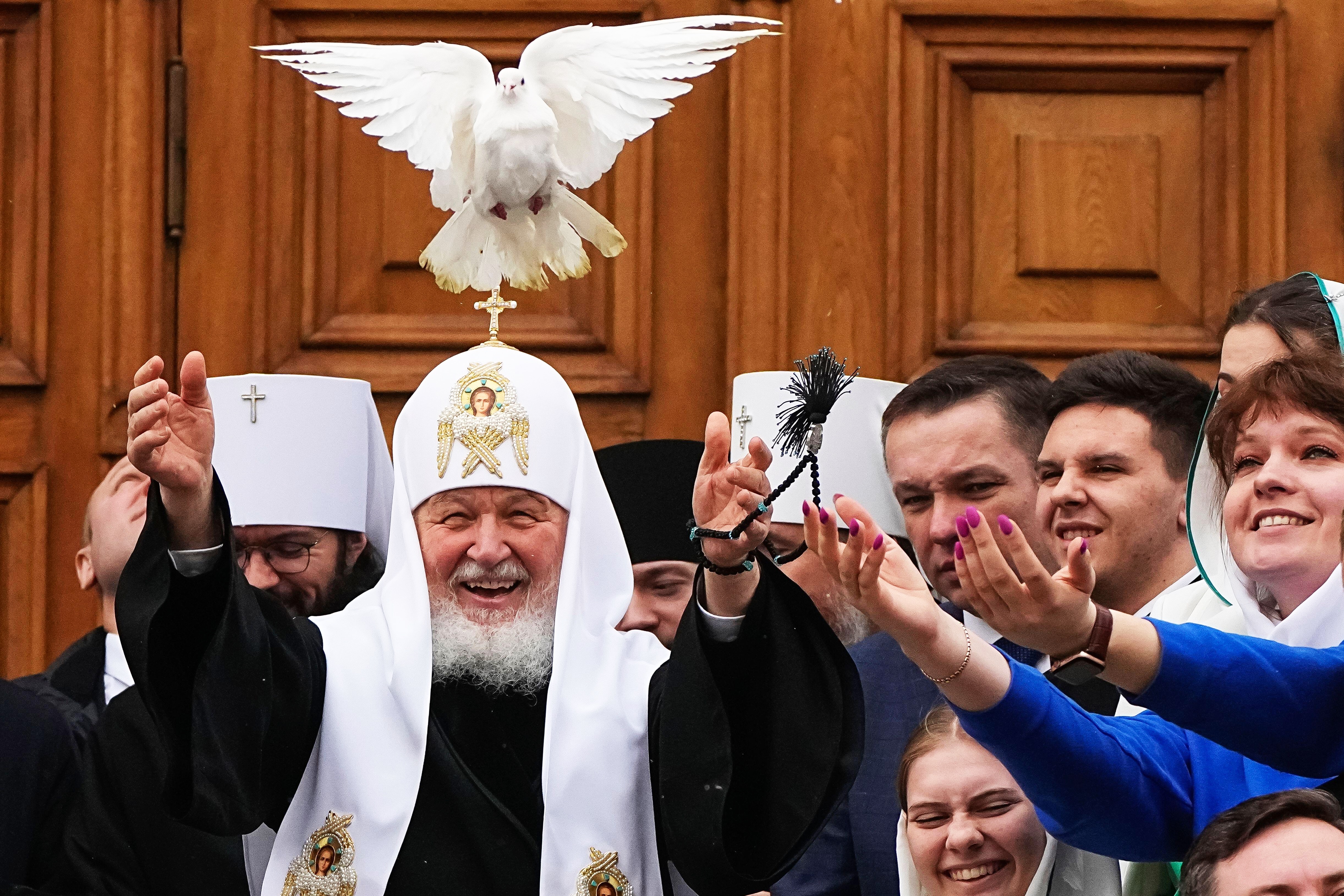Western religious leaders condemned Patriarch Kirill of Moscow for calling the Russian invasion of Ukraine a “holy war”.
Kirill, the head of the Russian Orthodox Church, said Vladimir Putin's two-year war in Ukraine was “defending the unified spiritual space of Holy Russia” in a long text approved by the World Russian People’s Council, which he heads.
This expanded on his already-explicit support of the invasion, claiming it prevented “the onslaught of globalism and the victory of the West fallen into Satanism”.
“At the end of the war, the whole territory of modern Ukraine is expected to enter Russia’s exclusive zone of influence,” the text said.
The head of the Geneva-based World Council of Churches (WCC), which represents Protestant and Orthodox churches around the globe, expressed “grave concerns” about the statement.
The WCC “cannot reconcile” it with assurances Kirill had himself given that no armed conflict can be called “holy”, said WCC secretary general Dr Jerry Pillay. “The decree contradicts this position.”
The WCC explicitly denounced the Ukraine invasion in 2022 as “against our fundamental Christian and ecumenical principles”. The Russian Orthodox Church, which Kirill represented at the WCC for decades before becoming patriarch in 2009, was present at these meetings.
Reinhard Flogaus, a Church historian at Berlin’s Humboldt University, said Kirill had “definitively disqualified himself for ecumenical cooperation”.
Another Church historian, Massimo Faggioli of Villanova University in Philadelphia, said the text moved the Russian Orthodox Church even closer to Putin and further from the Vatican.
Its idea of religion and God “is closer to that [of] Al-Qaeda than that found in the Gospel”, he wrote.
Volodymyr Bureha, vice-rector at the Kyiv Theological Academy, said that “while Christianity as a whole has travelled a difficult path from a theology of war to a theology of peace…Russian Orthodoxy today is rapidly moving in the very opposite direction”.
Writing for the online journal Public Orthodoxy, Bureha said the Russian Orthodox Church had joined many peace movements during the Soviet period but now “all this has been completely forgotten and completely discarded”.
Kirill’s public position has enflamed confessional hostilities in Ukraine, where Orthodox Christians are divided between the historically Moscow-aligned Ukrainian Orthodox Church (UOC) and the independent Orthodox Church of Ukraine (OCU), granted autocephaly by the Ecumenical Patriarch in 2019.
The Ukrainian government has imposed growing restrictions on the UOC in recent years, seizing property and arresting clergy accused of supporting the Russian invasion.
On 10 April the UOC synod, meeting in Kyiv, issued an appeal to parliamentarians not to adopt a bill into law which they said would suppress their Church in violation of religious freedom.
Bill No. 8371, “On Amending Certain Laws of Ukraine Regarding the Activities of Religious Organisations in Ukraine”, would prohibit religious organisations subject to Russian authority, effectively banning the UOC although it claimed to have cut ties with Moscow since the invasion and its leaders have consistently condemned Russian attacks.
The synod said the bill would “contribute to the incitement of religious enmity and intolerance” and “violates the principle of the autonomy of the religious community”.
Lawyers representing the UOC have accused the Ukrainian government of using “threats and intimidation” against its supporters, after the authorities made a number of news websites reporting on the Church inaccessible in Ukraine last month.
Robert Amsterdam, acting for the UOC, said the government was pursing “plans to breach international laws on human rights and religious freedom”.
“It is outrageous they are flouting international protections and all those who might vote for [bill No. 8371] should be ashamed of themselves,” he said.
However, the head of the OCU, Metropolitan Epiphany (Dumenko), denied that the bill threatens religious freedom because “the Russian state uses religion to justify aggressive warfare”.
“The proposed changes to the legislation in parliament do not affect freedom of religion, but on the contrary, protect religious organisations in Ukraine from becoming an instrument of Kremlin hybrid warfare,” he said in an address to the WCC last week.
On 11 April, OCU clergy reported that it only church in Russia, in the Moscow suburb of Noginsk, had been demolished by authorities alleging that it had disturbed the peace of the community.
Last week, a delegation from the ecumenical Conference of European Churches (CEC) visited Ukraine last week. The delegation, led by CEC president Archbishop Nikitas of Thyateira and Great Britain, held meetings in Lviv and Kyiv from 8-10 April.
“We are here to testify that our Ukrainian brothers and sisters are not abandoned and not forgotten,” said Archbishop Nikitas.
“People all over the world must know that Ukraine is not part of the Russian world,” he added, and “the sovereignty and integrity of Ukraine’s borders must be respected”. He highlighted CEC’s “Pathways to Peace” initiative, a response to the Ukraine war.
The delegation discussed peace-building initiatives at the Ukrainian Catholic University in Lviv, while in Kyiv they met the head of the Ukrainian Greek Catholic Church, Major Archbishop Sviatoslav Shevchuk, who said that in the post-Soviet era Ukrainians “realised that freedom of religion and religious peace are the cornerstone of Ukraine’s security”.
Viktor Yelensky, chairman of Ukraine’s State Service for Ethnopolitics and Freedom of Conscience, expressed similar sentiments last week in remarks to a delegation of German Catholic bishops, led by Bishop Bertram Meier of Augsburg. Yelensky insisted that Ukraine’s “only threat to freedom of conscience is Russian aggression”.
“No confession in Ukraine has any special privileges. The Ukrainian model of state-church relations is based on the principle of equality of all religious organisations, he said. “Ukrainian legislation on freedom of religion knows neither main nor prohibited Churches.”



 Loading ...
Loading ...